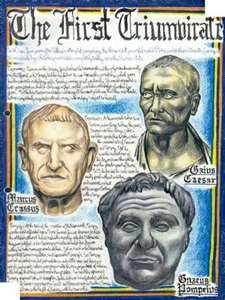The First Triumvirate
The First Triumvirate was an unofficial reorganization of the Roman power structure, uniting the three most powerful men of the age together at the head of the political order. Members of the First Triumvirate were Gaius Julius Caesar, Marcus Licinius Crassus, and Gnaeus Pompeius Magnus — or, more commonly, Caesar, Crassus, and Pompey. Crassus and Pompey were consuls in 70 B.C. Crassus was the richest man in Rome and a recent celebrity thanks to his instrumental role in the defeat of the rebel slave Spartacus. Pompey was a successful military commander who had won battles all over the lands surrounding Rome and who enjoyed considerable support in the Roman Senate. Crassus and Pompey didn't much care for each other, however, and their antipathy grew the longer they were in power together. At the same time, another general, Caesar, was making a name for himself as a legal scholar and a popular figure with the common people of Rome. He convinced Crassus and Pompey to create a secret alliance, including him, that would rule Rome, unofficially. Crassus and Caesar were friends. Caesar had to work harder to convince Pompey to join in, ultimately offering his daughter Julia as Pompey's wife. The First Triumvirate came into being in 60 B.C.
Antipathy again drove the triumvirs apart, with Caesar summoning the other two to a secret meeting, the Lucca Conference, in 56. They sorted out their differences to a point but never really eliminated the joint mistrust that so plagued their dealings with one another. Julia died giving birth to Pompey's son in 54. Pompey and Caesar, two jealous generals, had nothing to bind them anymore. The following year, Crassus died in battle against the Parthians, at Carrhae. Pompey had enjoyed considerable success winning battles in Spain. Caesar had done the same in Gaul, while also launching two invasions to Britain. By 52, when Pompey was elected sole consul, the two were heading toward a confrontation. Battle ensued in 49, after Caesar crossed the Rubicon River at the head of his army, breaking Roman law. Pompey assumed command of the governmental forces and went to war against Caesar. At the Battle of Pharsalus, in 48, Caesar won a decisive victory and assumed control of the Roman military and political system. Pompey fled to Egypt, where he was murdered. Caesar himself was murdered in 44, ironically breathing his last at the steps leading up to a statue of Pompey. |
|
Social Studies for Kids
copyright 2002–2026
David White



 In addition to political powers, the triumvirs gave themselves lands to rule over, with Crassus taking Syria, Caesar taking Illyrica and Gaul (both Cisalpine Gaul and Transalpine Gaul), and Pompey taking Spain. Each set about shoring up their rule over their respective lands.
In addition to political powers, the triumvirs gave themselves lands to rule over, with Crassus taking Syria, Caesar taking Illyrica and Gaul (both Cisalpine Gaul and Transalpine Gaul), and Pompey taking Spain. Each set about shoring up their rule over their respective lands.
